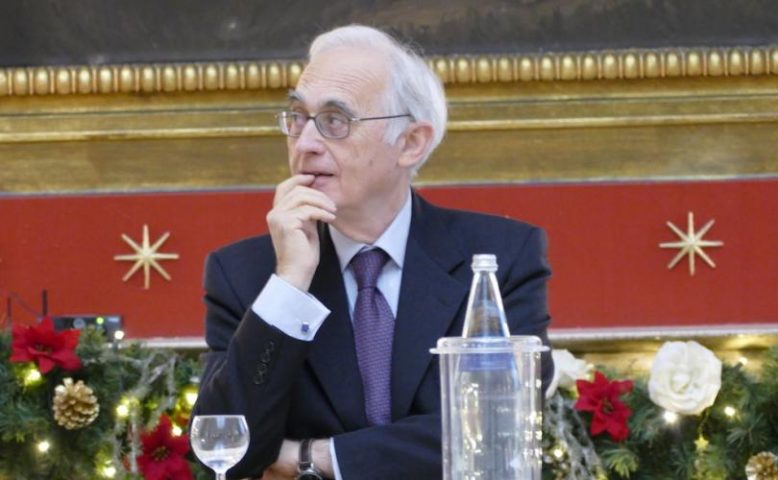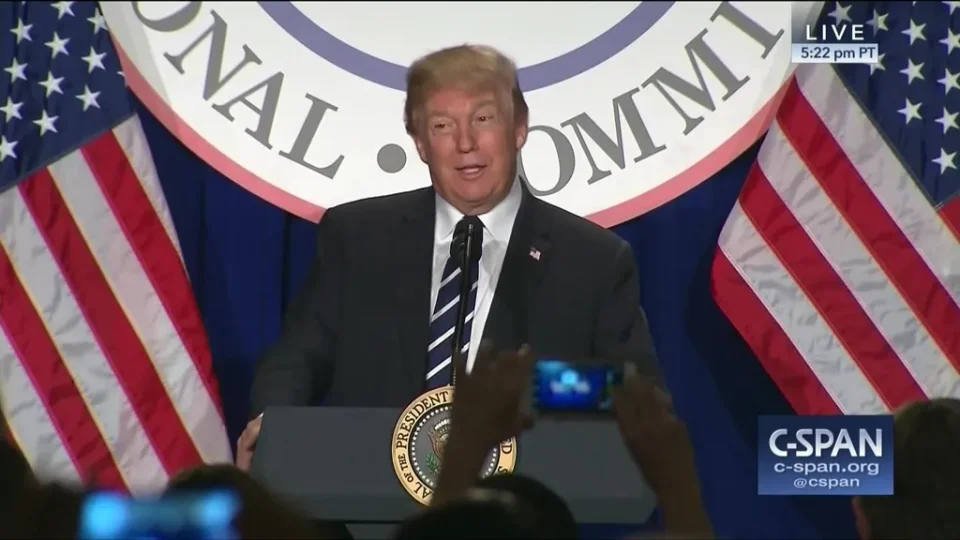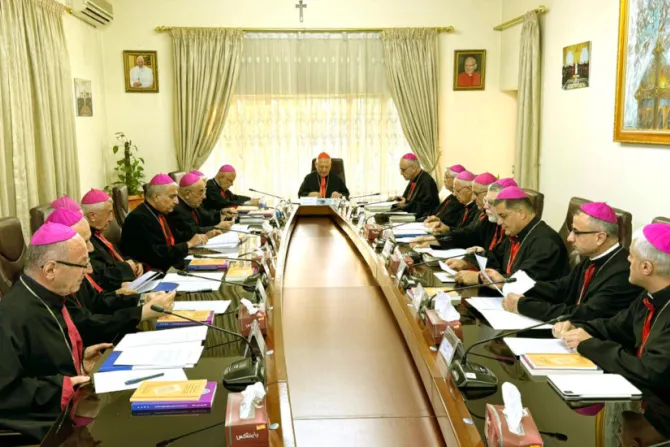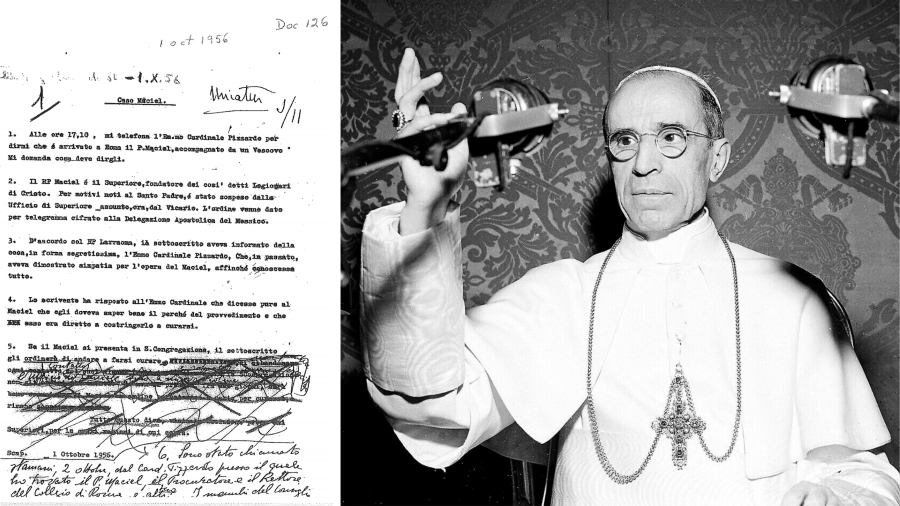Jim Daly: The Lure of Hallmark Christmas Movies
December 1, 2018Msgr. Charles Pope: Fortitude! A Call to Stay Engaged in Resolving the Abuse Scandal
December 1, 2018
Editor’s note: Here below we publish the official English text of a talk by Professor Roberto de Mattei, delivered on Thursday, November 29, in Rome, at a conference titled: ‘Pope Francis five years later: Continuity of rupture in the Church.’ The talk was translated by LifeSite Rome correspondent Diane Montagna.
By Roberto de Mattei, LifeSiteNews, Nov. 30, 2018
 Prof. Roberto de Mattei speaks in Rome on Nov. 29, 2018
Prof. Roberto de Mattei speaks in Rome on Nov. 29, 2018
ROME, November 30, 2018 (LifeSiteNews) — We are here to talk about a subject of enormous importance and I thank the organizers for inviting me to do so.
In general, we love to talk about our primary concern. A mother is moved by her nature to talk about her children, because they represent the good that is most dear to her, and if she doesn’t talk about them, they are never far from her thoughts.
There are those who speak and think only about their own health, meaning physical, because today we have forgotten that we have a soul.
There are those who speak only about food, because in the final analysis you are what you eat and food becomes the last horizon of one’s interest.
These are the most common topics of conversation, along with football [soccer], which is the ordinary way that Italians escape reality.
Politics is no longer talked about with the passion of former times, because we have lost our sense of the common good.
And little or nothing is said about the Church and its problems. In Italy, the average man is averse to such topics; they bore him and sometimes annoy him, because he lives immersed in practical atheism.
The age of militant atheism and of heated anticlericalism is over. Atheism has entered our bloodstream and courses through our veins, through the systematic secularization of society, advanced and implemented by the new Gramscian left.
For this reason, I congratulate the promoters of this conference, which confirms the existence of a remnant in Italy that is still immune to the secularism that is still very much alive. We show by our presence that we are spiritually and culturally alive, that we have not been suffocated by the poisonous miasma of secularization, and this is a reason for hope for our future. A future which the book by José Antonio Ureta, Pope Francis’ “paradigm shift,” helps to brighten. I appreciate your work for two fundamental reasons.
The first is that it offers us a brief but clear and precise assessment of what Pope Francis has done and said in the first five years of his pontificate.
This picture is disturbing and constitutes, as the author suggests, a “paradigm shift,” i.e., a discontinuity with the customs, traditions, institutions, and Magisterium of the Church of all time. This change in paradigm may not be evident in Pope Francis’ individual gestures and addresses, but it is irrefutable when one considers these gestures and acts as a whole, within the framework of a five-year pontificate.
Perhaps for some, one “buona sera” or a “who am I to judge” was enough to realize that something was amiss, but the majority of Catholics accepted Pope Francis without too much trouble, and they shy away from a debate on the consequences of his pontificate. This book is particularly important because it presents reality to those who don’t want to see, to those who want to forget, to those who want to minimize, to those who want to convince themselves that everything is unfolding in a normal and orderly manner.
But the second reason why this book is important is that while the first nine chapters offer us a comprehensive assessment of the paradigm shift, the last twenty pages — Chapter 10 and the conclusion — suggest how we ought to behave in this dramatic situation. The solution Ureta offers us is a balanced solution.
When we are under great tension, it is easy to lose our balance. One of the most needed virtues in the current crisis situation in the Church is balance. We need balance to stand. Whoever loses his balance falls, whoever stands resists, and today it is impossible to resist without balance.
Balance, we might say, along with patience, is the virtue of the strong. Balance is prudent strength, or strong prudence. Whoever acts impatiently, or in an unbalanced and disorderly manner, moves away from truth and true inner peace, which is tranquility in order.
Those who say, “I prefer to deceive myself about the Pope rather than to be right about him” manifest an imbalance. But there is also an imbalance in those who say: “Since the Pope deceives himself and deceives me, it means that he is not the Pope.”
The position of José Antonio Ureta, which is our position, is balanced because it is based on the fundamental distinction between the Church, which is holy and immune from all error, and the men of the Church, who can sin and err. Infallibility is reserved only to the Pope, when he teaches under certain conditions, or to the ordinary Magisterium, when it reaffirms with continuity and consistency the immutable truths of the Church.
In his latest interview with LifeSiteNews, Cardinal Müller said: “The Magisterium of the bishops and of the Pope stand under the Word of God in Holy Scripture and Tradition, and serves Him. It is not at all Catholic to say that the Pope as an individual person receives directly from the Holy Spirit the Revelation and that he may now interpret it according to his own whims while all the rest are to follow him blindly and mutely.”
If the ecclesiastical authorities teach error, it is lawful to resist them, and the right of resistance becomes a duty when the common good is at stake, according to the model taught by Saint Paul (Gal. 2, 11).
But resistance is not always enough. There are situations in which our resistance must be expressed in the suspension of all habitual coexistence with bad shepherds. And also here balance is needed. We are not talking about a juridical separation from bad shepherds. We are talking about a spiritual and moral separation, which does not question, on the juridical level, the legitimacy of those who govern the Church. José Antonio Ureta makes a very fitting comparison which is that of a separation, permitted by the Code of Canon Law, whereby a man or a woman can cease living with his or her spouse without divorcing or affirming the invalidity of his marriage.
If the ecclesiastical authority were then to impose canonical sanctions against those who remain faithful to Tradition, it would provoke a formal division in the Church. The responsibility for rupture would fall to the authorities who exercised their power illegitimately, and not on those who, respecting canon law, only remained faithful to their baptism.
The response to such sanctions should not be, “Since you condemn me, you are not the Pope” but rather, “These sanctions are unjust and illegitimate, even if you are, until proven otherwise, the legitimate Pope.” Until proven otherwise means that a Pope can lose his pontificate for many reasons, including heresy, but these reasons must be incontrovertible. The heresy, but also the invalidity of the election, must be manifest and widely-known to the whole Church, because the Church is a visible society and not an invisible congregation of elected people as Protestant sects are. In order to speak about notorious and manifest heresy, it is not enough that the Pope professes or publicly favors heresy; it must be perceived as such by Catholic public opinion. The bishops, and especially the cardinals — who are the electors and counselors of the Pope – must recognize these facts and see their consequences. Until then, a Pope must be considered legitimate.
This is balance. But this is only one part of a much larger problem that can’t avoid this basic question: “How did we get to this point?” How did we arrive at having to imagine our own separation even from the Supreme Pastor, who today is Jorge Mario Bergoglio, Pope Francis, the first to bear this name?
Allow me at this point to go beyond the book by José Antonio Ureta — but, I am convinced, in the same spirit.
We would be mistaken to imagine that the end of Pope Francis’s pontificate will represent the end of the process of the Church’s self-demolition.
In 2012, one year before resigning from his pontificate, Benedict XVI desired the Year of Faith to coincide with the 50th anniversary of the opening of the Second Vatican Council. His hope was that the texts bequeathed by the Council Fathers would be “widely known and taken to heart as important and normative texts of the Magisterium, within the Church’s Tradition.” This thesis — the thesis of the so-called hermeneutic of continuity — is the leitmotif of his pontificate, from the famous address to the Roman Curia on December 22, 2005, to his final address, which is less known but no less important, delivered on February 14, 2013 to the Roman Clergy.
In these addresses, Benedict XVI admits there is a link between the current crisis of faith and the Second Vatican Council, but he maintains that this crisis is due not to the Council itself, but to a bad hermeneutic, to an incorrect interpretation of its texts.
The hermeneutic of continuity was the polar star of the pontificates of John Paul II and Benedict XVI for 35 years, from 1978 to 2013. But in these 35 years, despite the efforts of the two popes and the bishops who were moving along the same line, the hermeneutic of continuity has not been able to stop the process of the Church’s self-demolition, which was first denounced fifty years ago, in 1968, by Paul VI. It didn’t succeed in stopping it, because one doesn’t stop a historical process with a debate over hermeneutics. If in the last 50 years, the proponents of the hermeneutic of continuity have not prevailed, but rather those proposing a hermeneutic of discontinuity, it is because the former have deluded themselves into believing they can limit the discussion to the hermeneutical level, the level of interpretation of documents, while the latter, i.e. progressives, have disregarded the documents and have advanced on the field of praxis, in keeping with the spirit of Vatican II, which affirmed the primacy of pastoral care, i.e., of praxis over doctrine. The essence of the Second Vatican Council was the triumph of pastoral care over doctrine, the transformation of pastoral care into a theology of practice, and the application of the philosophy of Marxist praxis to the life of the Church.
Benedict XVI’s resignation of his pontificate on February 11, 2013 represents, in my opinion, the failure of his attempt to separate post-conciliar praxis from the Second Vatican Council, isolating the texts of the latter from history.
Pope Francis embodies the thesis opposing Ratzinger’s. He is not interested in theological debate, nor in the hermeneutical one. Pope Francis represents the playing out of Vatican II, and the triumph, in his person, of pastoral care over theology. Therefore, there is no rupture between the Second Vatican Council and Pope Francis but rather historical continuity. Pope Francis represents the ripe fruit of Vatican II.
The pontificate of Pope Francis has certainly represented a “paradigm shift,” as Ureta rightly says, but the true great turning point of this five-year period, in my view, is not Pope Francis’ pontificate but the reaction that this pontificate has provoked among Catholics around the world. Pope Francis’ pontificate, precisely because it is disastrous, has highlighted the existence of a crisis in the Church that would otherwise have been ignored.
This reaction has been manifested through several important initiatives:
In 2015 a coalition of lay associations collectively known as Supplica Filiale collected 900,000 signatures from the faithful who were asking for a word of clarification on the issues raised by the Extraordinary Synod on the family. The answer to this Supplication was silence.
In 2016 four cardinals presented Pope Francis with five dubia on Chapter 8 of the Apostolic Exhortation Amoris Laetitia. The answer to these dubia was silence.
In 2017, 40 scholars, who later grew to 250, addressed a correctio filialis to Pope Francis, accusing him of spreading errors and heresies in the Church. The answer to this correction was silence.
In 2018 Archbishop Carlo Maria Viganò brought to light the existence of a network of corruption among the ecclesiastical hierarchies, calling into question all those responsible, beginning with Pope Francis, whose resignation he called for.
The answer to this document was silence.
All of these initiatives have had immense repercussions, but the answer has only been silence. A silence that constitutes a dramatic confirmation of the truth of the accusations.
The “listening Church” of Pope Francis listens to everyone except those who are entirely faithful to the Gospel and to the perennial magisterium of the Church. Pope Francis uses the same fierce language towards his critics that Lenin used against his opponents.
On September 3, 2018 at Santa Marta, Pope Francis called those who criticize him “a pack of wild dogs.” Two days later, on September 5, 2018 the author Marcello Veneziani, respondedIl Tempo: “No, Your Holiness, a Pope cannot call his neighbors ‘wild dogs,’ and especially when it comes to Catholics, Christians, believers. Dogs is the derogatory term that Muslims use for infidels and Christians. The popes who preceded Francis called even the most ruthless terrorists ‘men of the Red Brigades,’ or men of ISIS. Never dogs. Descending to such spiteful levels is unworthy of a Holy Father.”
Being named “dogs” does not bother us. In Holy Scripture, unfaithful shepherds are called “dumb dogs” who have stopped barking and fall asleep (Isaiah 56:10-11). We glory in being domini canes, dogs of the Lord, who bark in the night to break through the silence. Saint Gregory the Great writes in the Pastoral Rule that the bad shepherds, “fearing to lose human favor, shrink timidly from speaking freely the things that are right; and (…) when the wolf comes they hide themselves under silence. For hence it is that the Lord through the prophet upbraids them, saying, Dumb dogs, that cannot bark” (Is 56:10).
Today’s dumb shepherds threaten the dogs who bark, saying to them: “In accusing Pope Francis you are accusing the popes who preceded him, because the faults that you attribute to the reigning pontiff date back to them.” In his latest book, The day of judgment [Il giorno del giudizio], Vaticanist Andrea Tornielli does not deny the revelations of Archbishop Viganò about the corruption of Cardinal Theodore McCarrick and the existence of widespread immorality within the Church. But since his objective is not so much to refute Msgr. Viganò as is it to save Pope Francis, he does so by behaving like a card player who, finding himself in difficulty, raises the stakes: If Pope Francis is responsible, Tornielli says, more responsible than him are his predecessors — Benedict XVI and John Paul II — under whose pontificates the corruption developed.
The accusation does not disturb us, and if the responsibility of John Paul II and Benedict XVI in the moral decadence and spread of the errors over the last decades were to be proven, we would not be afraid to admit it, because first and foremost we are seeking the truth.
The Church does not fear the Truth, because the Church is the Truth. The Church is the Truth because she is divine and because she proclaims to the world the Truth of her Head and founder, Jesus Christ, who said of himself, “Ego sum via, veritas et vita [I am the way, the truth, and the life]” (Jn 14:6). Therefore, we are not afraid to tell the truth about the deep doctrinal and moral crisis that the Church is experiencing today.
It is love for the truth that drives us to say that it is hypocrisy to limit the scandals to pedophilia, as presidents of bishops conferences from around the world will do — when they gather in Rome at the request of Pope Francis, on February 21-24 — ignoring the scourge of homosexuality which is not only a vice against nature, but also a power-structure within the Church. And it is hypocritical to limit oneself to denouncing moral scandals, without going back to their doctrinal roots, which date back to the years of the Council and to post-conciliar period.
If the last five years of Pope Francis’s pontificate can be judged a disaster, how can we deny ourselves the right to call the process of the Church’s self-demolition, which today has reached its final consequences, a disaster as well?
The time for truth has come. And the truth that clearly leaps out before our eyes is the failure of a pastoral project that belongs not only to Pope Francis but also to Vatican II. That Council heralded a great pastoral reform to purify the Church, and instead resulted in an historically unprecedented corruption of faith and morals, because it reached the point of not only enthroning homosexuality among the highest ecclesiastical hierarchies, but also of allowing it to be publicly defended and theorized.
The final tally of the last five years of Pope Francis’s pontificate reveals the failure of a paradigm shift, which is the failure of a pastoral project.
Pope Francis’ watchwords are “synodality” and “the peripheries.” Synodality is the transfer of power from top to bottom: a Revolution that de-verticalizes the Church; the peripheries represent a horizontal Revolution that decentralizes and de-territorializes the Church. But in recent weeks the Holy See has denied the primacy of synodality and the peripheries, intervening heavily to prevent the American bishops from publishing transparent guidelines on the subject of sexual abuse. This intervention is also a betrayal of that cleansing in the Church, in whose name Pope Francis had asked the American cardinals to vote on it.
And it is especially from America that the voice of fidelity to the law of the Gospel is loudest today. The pontificate of Pope Francis is in discontinuity with the Church’s Tradition, which is accused of pharisaism, of fixism, of legalism, but it has not extinguished the flame of the Church’s Tradition. On the contrary, never before as in these last five years, at the center and in the peripheries, in seminaries and on blogs, does Tradition seem to be reviving in young and old, laymen and clergy, who every day rediscover the perennial truth of the faith and traditional rites of the Church and, with the help of God, are determined to defend them.
Today the Novena of the Immaculate Conception begins, which introduces us into one of the most beautiful feasts of the Catholic liturgy. At the feet of Our Lady, we, the children of Eve, wounded by original sin, but with immense trust in Mary, proclaim: Tota pulchra es Maria et macula originalis non est in te.
Similarly, we who are members of a Church that is wounded in its human element, disfigured by the errors and sins of men who govern it, but immaculate in its essence proclaim: Tota pulchra es Ecclesia et nulla macula est in te. The Church is all beautiful and there is in her no sin, no error. The Holy Roman Church — one, holy, catholic and apostolic — is our Mother who continues to nourish us with her Sacraments and protect us with the shield of her doctrine, as we, with God’s help, strive to defend her against all external and internal enemies that threaten her. The Immaculate Heart of Mary will triumph.
Translation by Diane Montagna, Rome correspondent for LifeSiteNews





 Prof. Roberto de Mattei speaks in Rome on Nov. 29, 2018
Prof. Roberto de Mattei speaks in Rome on Nov. 29, 2018

